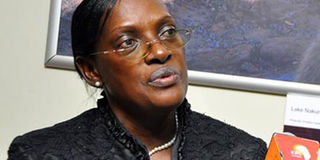Regulation can’t stop bank failure, says Bagyenda

Ms Justine Bagyenda, the BoU executive director in charge of supervision.
What you need to know:
- Purpose. After Crane Bank collapse, many are questioning BoU’s role.
Kampala.
As Ugandans await perhaps the largest legal battle in Uganda’s corporate history between Bank of Uganda (BoU) and Mr Sudhir Ruparelia, questions have been raised on the role of the Central Bank.
BoU is seeking to recover about Shs400b that it alleges Mr Ruparelia fraudulently took out of the bank. On the other hand, the regulator has also been sued for failing to detect the alleged fraud at Crane Bank.
During the Annual Bankers Conference on Wednesday at the Kampala Serena Conference Centre, Ms Justine Bagyenda, the BoU executive director in charge of supervision, did not refer to any of these cases but made a statement indicating that even with regulations in place, a bank failure cannot be stopped.
“Regulations are meant to curtail bank failure. However, regulation will never stop bank failure,” she said, adding: “For one to steal money, they do not need to steal from another bank. To steal, you can open your own bank and you will steal without regulators knowing it.”
At the conference, there was a clear avoidance of the Crane Bank demise and eventual sale to dfcu Bank, in part because this was a matter before.
The supervision department has been under the microscope for its role in failing to detect the fraud at the defunct Crane Bank.
Although BoU says it is constrained to comment on this issue, the International Monetary Fund (IMF) noted that BoU needs to be “intrusive” when looking at financial statements of commercial banks.
“The authorities agree that the experience calls for more intrusive supervision, and explained that they are also focusing on banks’ risk management frameworks,” the IMF staff report released last week reads, in part.
Regulators left behind
On top of discussing regulations to keep the bank in check, the conference also discussed how fast paced innovation was leaving regulators behind. Several products coming on board that deal with financial services and BoU is often playing catch up.
During a panel discussion on Regulatory Oversight and Reforms, Mr Frederick Mpanga, a partner at AF Mpanga, noted that “innovation will always move faster than regulation.”
He said the solution is not to legislate all the time a new innovation comes up, but rather use contracts and guidelines.
For instance, mobile money is governed by a set of guidelines. Uganda’s banking regulations have mainly been focused on credit management and risk. “What we need to see is a regulatory sandbox – test the legal regime – and see whether it allows innovation to facilitate access to financial services,” Ms Jacqueline Musiitwa, the chief executive officer of Financial Sector Deepening Uganda, said while on the panel.
Cybercrime
Other concerns raised during the conference include the risk to cybercrime as commercial banks continue to invest heavily in technology. Mr Emmanuel Tumusiime-Mutebile, the BoU Governor, for instance, warned banks on the “…protect the integrity of individual customer’s accounts and to prevent threats to the financial safety of the bank itself.”
Mr Faron Farachi, the country manager Gilat Telecom, told delegates at the conference that even with regulations, banks needed to invest in their human resource because they lack knowledge on cyber threats like hacking.




